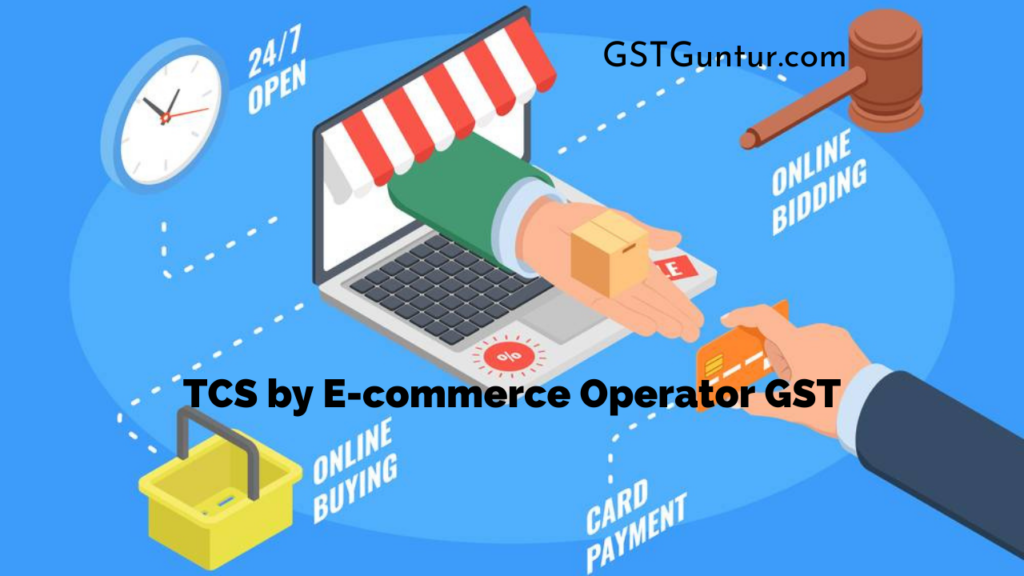TCS by E-commerce Operator GST: Electronic commerce operators like Amazon, Flipkart, and Snapdeal must collect Tax Collection at Source (TCS) at the rate of one percent of the net sales of goods or services made through their platform. The operator manages tax, which is to be collected only on the amount.
- Calculating Net Sales
- Paying of Tax and the Statement Filing
- Input Tax Credit to Supplier
- Service of Notice issued by Officer
Calculating Net Sales
Net sales are equal to the sales made through the platform reduced by the number of goods that the customer returns. The sales of services on which an e-commerce operator is liable to pay GST tax under section 9(5) are not included in the net sales, and thus, no tax is to be collected on such mentioned amounts. At present, cab aggregators like ola and uber are notified under section 9(5). Therefore, they are themselves liable for the collection and deposition of GST. Also, in this case, the net sales will include the amount of GST and the operator’s commission.
For example: If a supplier makes a net sale of Rs. 1,00,000, and then the Customers return Rs 10,000 worth of products; the net sale will come to Rs. 90,000, and TCS will be at 1%. In other words, Rs. 900 has to be deducted by the operator while making a payment to the supplier.
Paying of Tax and Statement Filing
The amount collected by the operator as TCS is to be deposited within the ten days, starting from the end of the month in which collection is made.
Also, details of outward supplies made, the returned reserves, and the amount assembled during the month will be filed within ten days at the end of the said month. Such a statement is to be filed in Form Type GSTR-8.
Suppose the operator discovers any omission or incorrect particulars in a statement filed, other than as a result of scrutiny, audit, inspection, or enforcement activity by the tax authorities; in that case, he shall rectify any such omission or incorrect details in the statement to be granted for the month during which such an omission or any such inaccuracies are noticed in subject to payment of interest.
No rectification as mentioned earlier or modification of any omission or incorrect details shall be allowed after any of the following dates mentioned below:
- The 10th of October of the next financial year
- The actual date of providing the relevant annual statement.
Additionally, an annual statement should be filed for every financial year on or before the 31st of December following the end of the year.
Input Tax Credit to Supplier
The supplier who has contributed the goods or any of his services through the e-commerce portal can claim such an input tax credit in his electronic cash register. The information provided by the operator is made available to the supplier in Part-C of Form Type GSTR02A after the due date of filing the GSTR-8.
If the details furnished by the e-commerce operator and the supplier do not match, the discrepancies will be communicated to both parties.
Suppose the discrepancy is not resolved by the supplier in his return or operator in his statement in the month in which the difference is communicated, in that case, such an amount will be added to the output tax liability of the supplier only where the value of external supplies furnished by the operator is more than the value of external supplies provided in the month in which the inconsistency is communicated. The supplier will also be needed to pay interest starting from the due date of payment to the date of its original amount.
Service of Notice Issued by Officer
An officer who is not below the grade of the joint commissioner may serve a notice to the operator asking for information related to supplies of goods and services during any period and the stock of goods held by suppliers in repositories or warehouses supervised by such operators and declared as auxiliary places of business by such suppliers.
The operator has to furnish the required information within 15 days of service of the made notice. If the e-commerce operator fails to deliver such information, they are liable to a pay penalty that may extend to Rs. 25,000.
Conclusion
This provision for e-commerce portals may bring many hardships to the new and upcoming portals that operate on a small scale. A person selling through such an e-commerce operator has to register under GST regardless of the turnover. The government may bind the e-commerce operator to match its total sales with GSTIN wise sales and thus ensure that only registered persons work through the e-commerce operator. And therefore, TCS is not necessary.
